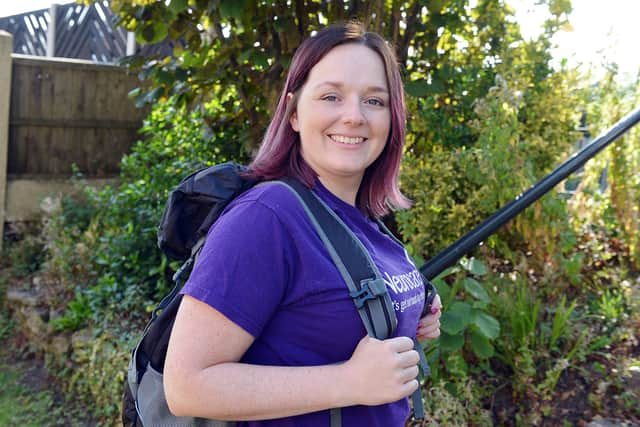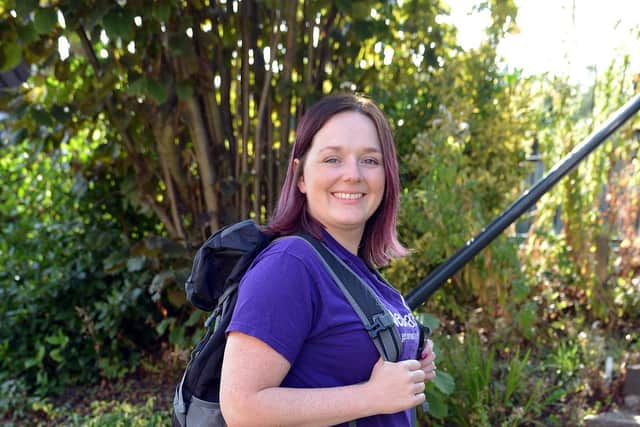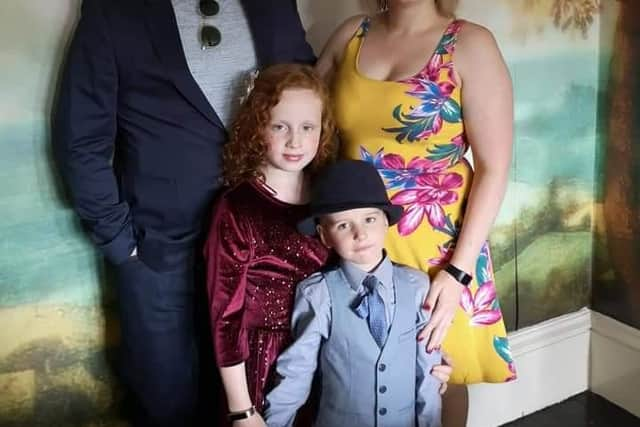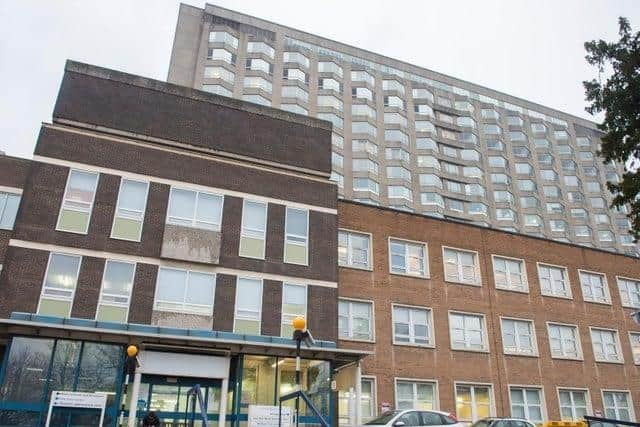Inspirational mum fundraising for Sheffield hospitals as she continues recovery after brain tumour surgery
and live on Freeview channel 276
Those horrifying words were revealed to mum-of-two Deborah Peacock in 2017 – and her whole life was thrown into disarray.
Since then, the 34-year-old has gone through surgery, radiotherapy and chemotherapy in Sheffield, all while staying positive and keeping a smile on her face.


Advertisement
Hide AdAdvertisement
Hide AdInspirational Deborah is now doing well – and preparing to take part in a marathon walk to support two charities very close to her heart.
Deborah said: “In January 2017 I had my first symptoms and the following month I had my first epileptic seizure.
“On February 28 2017, my consultant broke the devastating news that I had a brain tumour.
“Less than a month later, I was on the operating table at the Royal Hallamshire Hospital.


Advertisement
Hide AdAdvertisement
Hide Ad“With the biggest grin, my surgeon happily told me he’d removed around 95 per cent of my tumour, which had been the size of a large orange.
“I went on to have six weeks of radiotherapy and endured 36 weeks of chemotherapy treatment.
“There have been ups and downs on my journey but I’ve remained positive and had the most amazing support from my family, friends and colleagues along the way.
“Now, I’m pleased to say I’m doing well.


“A scan in December showed the tumour was stable and I haven’t had a seizure in almost 18 months now – so I recently got my driving licence back which means a lot to me.”
Advertisement
Hide AdAdvertisement
Hide AdDeborah, an accountant, has been working from home throughout the coronavirus pandemic.
Her children, nine-year-old Oona and seven-year-old Freddy, have been by her side until they returned to school recently.
“Health-wise, we’ve all been lucky and I’m not in a vulnerable position with my chemo long since over,” said Deborah.


“The impact of Covid-19 I did feel, though, was waiting for my latest scan.
Advertisement
Hide AdAdvertisement
Hide Ad“I would have normally had one in June but as routine appointments were being postponed it was delayed and I only got it three weeks ago – I’m waiting for the results.
“It was strange in the hospital, where it’s usually very busy and running late.
“It was eerily quiet, running on time and very efficient.
“I even walked straight into the lift within minutes of arriving in the building!”
On the day of the rescheduled London Marathon, October 4, Deborah will join a small team in walking from her home to Weston Park Hospital in Sheffield and back – a distance of 26 miles.
Advertisement
Hide AdAdvertisement
Hide AdThey will be raising money for Weston Park Cancer Charity and Neurocare, which aids the neurosciences department at the Royal Hallamshire Hospital.
Deborah said: “I applied for the 2020 London Marathon ballot but didn’t get a place – so I decided that was it and committed to my own marathon on marathon day.
“Of course marathon day was rearranged from April 26 to October 4 because of the pandemic so I postponed my challenge too.
“Recently the London Marathon was opened up virtually so I signed up - more incentive to go the distance.
“I’m really looking forward to it.”
Advertisement
Hide AdAdvertisement
Hide AdDeborah, of Barlborough Road in Clowne, Derbyshire, urged people to support the fundraising and added: “Any donation, no matter how small, will help make a difference.
“It will mean so much to my chosen charities, the NHS and the patients – like me – whose lives have been improved and saved.”
People can donate at https://bit.ly/3chjHOC
Fact file on brain tumours
According to the NHS, a brain tumour is a growth of cells in the brain which multiplies in an ‘abnormal, uncontrollable way’.
Brain tumour symptoms vary depending on the exact part of the brain affected.
Common symptoms include:
- headaches
- seizures
- persistent nausea, vomiting and drowsiness
Advertisement
Hide AdAdvertisement
Hide Ad- mental or behavioural changes, including memory problems or changes in personality
- progressive weakness or paralysis on one side of the body
A spokesperson for the NHS said: “Sometimes, you may not have any symptoms to begin with or they may only develop very slowly over time.
“Contact your GP if you have these types of symptoms – particularly if you have a headache that feels different from the type of headache you usually get or if your headaches are getting worse.
“You may not have a brain tumour – but these types of symptoms should be checked.”
Advertisement
Hide AdAdvertisement
Hide AdBrain tumours can affect people of any age, including children, although they tend to be more common in older adults.
More than 11,000 people are diagnosed with a primary brain tumour in the UK each year, of which around half are cancerous. Many others are diagnosed with a secondary brain tumour.
The cause of most brain tumours is unknown – but there are several risk factors which may increase your chances of developing a brain tumour, including age, radiation exposure, and family history and genetic conditions.
The NHS spokesperson added: “The outlook for a malignant brain tumour depends on things like where it is in the brain, its size, and what grade it is.
Advertisement
Hide AdAdvertisement
Hide Ad“It can sometimes be cured if caught early on, but a brain tumour often comes back and sometimes it isn't possible to remove it.”
Deborah, who is keen to raise awareness about brain tumours, offered advice to people who have been diagnosed with the cancer.
“You’ve got to be positive, you’ve got to trust the professionals and you’ve got to talk about it – talking is therapy,” she said.
“Take each day as it comes – and try and have a laugh.”
For more information about brain tumours, visit www.nhs.uk/conditions/brain-tumours and www.thebraintumourcharity.org